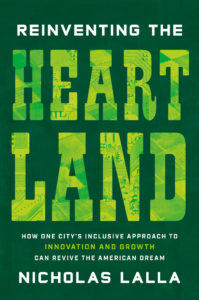
Why cities need “effective troublemakers”
26 February 2025
by Jonathan Andrews
Cities are at a crossroads, according to Nicholas Lalla, struggling between legacy industries and the promise of technological transformation.
His new book offers a timely and compelling blueprint for urban reinvention. Lalla, a seasoned economic development leader, lays out an action plan that city leaders can follow to drive meaningful change while balancing disruption with stability.
Reinventing the Heartland: How One City’s Inclusive Approach to Innovation and Growth Can Revive the American Dream draws from his experience spearheading innovation in Tulsa, Oklahoma.
In an interview with Cities Today, Lalla shares insights into the core themes of his book and the lessons he hopes will inspire a new generation of civic innovators.
Disruption with trust
A key theme in Lalla’s book is the idea that city leaders need to be “effective troublemakers”—bold enough to challenge the status quo while maintaining institutional trust. Finding that balance, he argues, is critical for cities to thrive in an era of rapid technological and economic change.
“In the United States, we talk a lot about people on the coasts living in bubbles,” Lalla says. “But I think every city is its own bubble. Civic leadership can become a bubble unto itself, and to catalyse the type of urban reinvention my book argues for, cities need to support leaders who can see beyond that.”
Lalla warns that leaders who have been entrenched in their roles for decades often become focused on preserving institutions rather than driving transformation.
“What’s exciting about Tulsa is that a new generation of leaders is emerging, and they’re not afraid to push for change. But it’s not just about disrupting—it’s about coalition-building, about bringing communities along with you.”
Identifying a tech niche
Lalla also emphasises the importance of fostering collaboration between government, the private sector, and civic institutions. His experience in Tulsa offers a model for other cities looking to harness emerging technologies for economic growth.
“One of the things Tulsa Innovation Labs did well was to bring the public, private, and social sectors together from the beginning,” he says. “We started by identifying Tulsa’s tech niche through rigorous landscape assessments and industry analysis. Then, we worked methodically to create a shared vision for growth.”
This approach led to initiatives like EIC Rose Rock, a start-up accelerator and venture fund focused on energy tech.
“Tulsa was once the oil capital of the world, but it lacked a strong entrepreneurial ecosystem in energy tech. By involving major corporate players in our strategic planning process, we were able to secure multi-million-dollar investments from the region’s top energy firms. That wouldn’t have happened if we hadn’t engaged them from day one.”
Common pitfalls in economic development
 Lalla’s book also sheds light on common mistakes cities make when adopting emerging technologies. One major pitfall, he argues, is the over reliance on corporate attraction as a quick fix for economic woes.
Lalla’s book also sheds light on common mistakes cities make when adopting emerging technologies. One major pitfall, he argues, is the over reliance on corporate attraction as a quick fix for economic woes.
“Too many cities believe they’re just one company away from transforming their economy,” he said. “But without investing in the underlying assets—talent, infrastructure, and strategic industry clusters—they won’t be able to sustain that growth.”
Another frequent issue is the lack of coordination among civic organisations.
“In Tulsa, economic development used to be scattered across various groups, each investing in separate projects without a unified strategy. That approach spreads capital too thin and prevents any one cluster from achieving real density and momentum.”
Finally, Lalla points to the psychological barriers holding cities back.
“There was a time when many leaders in Tulsa just didn’t believe the city could become a tech hub. They were jaded by past failures. A big part of my team’s work was shifting that mindset—helping people believe that transformation was possible.”
The role of data and AI in the future of cities
Looking ahead, Lalla sees data and artificial intelligence playing a crucial role in urban development over the next decade.
“Cities need to leverage AI to identify opportunities for growth and make smarter, data-driven decisions,” he explains. “The future belongs to cities that can analyse labour markets, monitor industry trends, and rapidly adapt their workforce training programs.”
He also cautions that cities that fail to embrace digital transformation will struggle. “The exponential innovation happening in tech should be a wake-up call. If mid-sized cities don’t start making big investments now, they’re going to be left behind.”
One promising model is Tulsa’s Cyber Skills Center and Atlas School, which focus on rapid workforce up-skilling.
“It’s not just about the curriculum—it’s about building the programmatic infrastructure that allows cities to stay agile. Training needs will evolve quickly, and cities must be prepared to adjust.”
A book to inspire action
Writing this, his first, book, Lalla was driven by a desire to share Tulsa’s story and provide actionable insights for other cities.
“When you’re leading an economic development initiative, you’re moving a mile a minute,” he notes. “Writing this book was a chance to stop, reflect, and analyse what worked and what could have been done better.”
More than anything, he hopes the book serves as a practical guide for urban leaders.
“I’m not a theorist—I’m a practitioner,” he adds. “I want this book to inspire action and investment, not just conversation. My goal was to create an action plan for urban reinvention that other cities can adapt and implement.”
Reinventing the Heartland is available from 4 March.
Image: Nicholas Lalla













